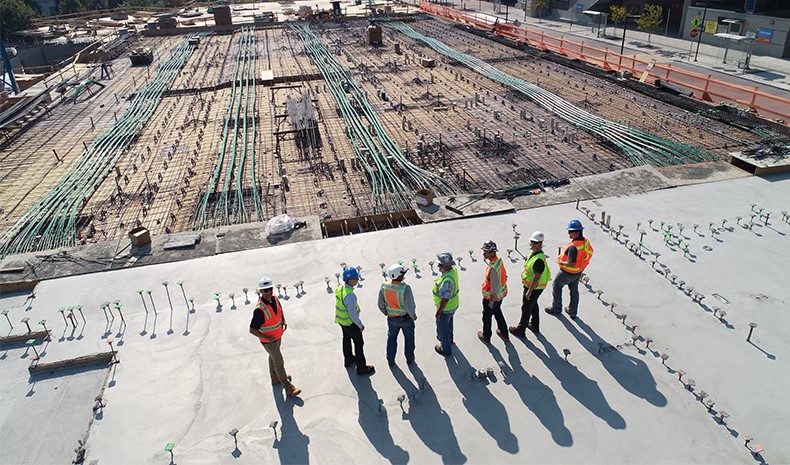The following is a guest article by Jake Belfry of Maneuver Up Marketing. Submit your own idea for a guest post here.
It’s no secret that the construction industry is booming.
The Federal Bureau of Labor Statistics reports that in the first quarter of 2018, construction employers began looking to fill an average of nearly 225,000 construction jobs each month, a trend that has continued into the current year.
Confidence, spending, investment and training among builders, suppliers and other vendors within the sector are at an all-time high and forecasts are that there will be enough work for years to come. In fact, it seems that employers are struggling to find skilled labor to keep up with the demand.
As more and more businesses vie for their piece of the pie, one of the primary distinctions between those destined for success and failure is the ability to keep themselves protected from the all-too-common liability in this industry. This means, among other measures, making sure their business is protected with an adequate commercial insurance policy.
Statistics on Injury for the Construction Business
While construction is one of the largest and most profitable contributors to the current United States economy, it also continues to be one of the most dangerous.
Data from the Bureau of Labor and Statistics reveals that there were 5,147 fatal workplace injuries in the United States in 2017, nearly 21 percent of which occurred in the construction industry (according to reporting from the Occupational Safety and Health Administration).
The agency also reports that one in ten construction workers are injured on the job each year. These injuries occur across all just about every area of the construction industry, including:
• Landscaping
• Gutter Installation
• Framing
• Roofing
• Electrical
• Drywall
• Plumbing
• Masonry
• Painting
• Heating And Cooling/HVAC
The leading causes of private sector worker deaths (excluding highway collisions) in the construction industry were falls, followed by being struck by an object, electrocution, and getting caught-in or between dangerous places or objects (workers killed when caught-in or compressed by equipment or objects, and struck, caught, or crushed in collapsing structure, equipment, or material). Construction accounts for only 4% of workers but over 20% of workplace deaths. It’s not worth playing the odds.
Statistics on the Cost of Injuries in Construction
Workers' compensation claims rates in the construction industry consistently outpace all other fields.
Data from the Center for Construction Research and Training indicates construction employer spending on Worker’s Compensation is nearly three times the average rate of all industries. A joint analysis from the Pacific Institute for Research and Evaluation and the Center to Protect Workers’ Rights reveals that the total costs of fatal and non-fatal injuries in the construction industry were estimated at $11.5 billion in 2002, 15 percent of the costs for all private industry. This number has only gone up in recent years with the growth in construction and specialization.
Without commercial insurance coverage, smaller construction businesses are at significantly increased vulnerability for financial exposure, legal liability and subsequent bankruptcy—the stakes are just too high to go it alone.
What Type of Liability Insurance Does Your Construction Company Need?
Any construction contractor or builder, regardless of their size, needs to invest in commercial insurance, whether they specialize in residential or commercial projects. Many businesses are required by their clients to carry specific coverages before they can work for them. Commercial insurance policies for construction companies typically offer a wide range of coverage benefits, including:
• General Liability – Protects your business if it’s responsible for events like property damage, bodily injury or defective work
• Commercial Auto – Protects vehicles used in your business including those that transport your tools and equipment
Other coverage options under commercial insurance policies can include Business Owners Policy (BOP), which combines General Liability with coverage for your commercial buildings and personal property and Workers’ Compensation coverage for employee medical costs and a portion of lost wages if they become ill or injured while they are at work.
Where to Get Insurance for Construction
All major insurance providers will offer some level of commercial insurance protection for large and small construction companies, including companies like Liberty Mutual, Progressive, Geico and others. Before choosing an insurance provider, it’s important to assess the scope of your company’s needs, your long-term goals, and your financial resources. The reality is that many companies simply can’t afford to carry every feature offered in these policies, and it’s critical that you have a thorough idea of what you need versus what you can feasibly afford versus other operational costs like payroll and employee health benefits. Many companies have designated insurance providers to assess and identify the best options.
Why Your Construction Company Should Have Commercial Insurance
We have established that workplace accidents and damage to both personnel and property are a fact of life and part of doing business; this reality is even more glaring in the construction industry. Whether you want to grow your construction company to offer new services, or you simply want to maintain the status quo and keep your employees safe and protected, commercial insurance coverage, at even the most basic level, provides a safeguard against accidents that, as we’ve seen from the numbers, are all too possible.
At the end of the day, you’d never have your employees go on the job site without their hard hats and other protective gear; think of commercial insurance as your organization’s protective attire against crippling financial expenditures, legal exposure and compromised employee safety. In short, there’s no reason not to have this extra layer of protection.
--
Jake Belfry
Maneuver Up Marketing






Comments